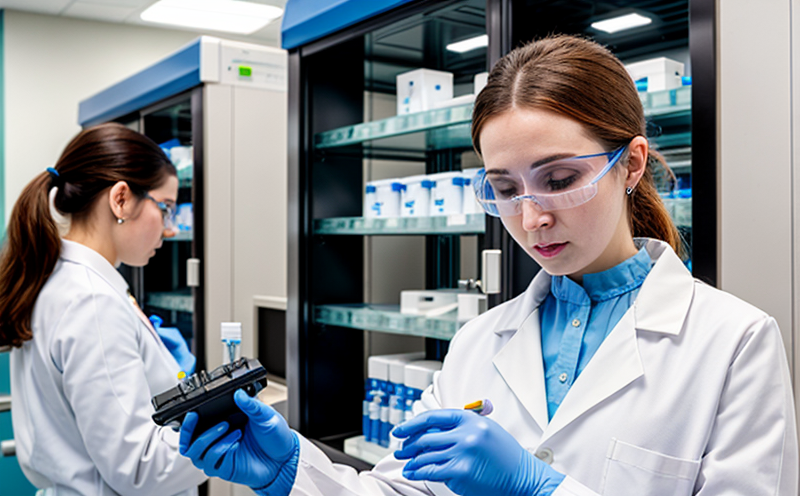Peptide Drug Bioanalysis Testing
In the pharmaceutical sector, peptide drugs are an essential and rapidly growing segment due to their unique properties that allow them to target specific biological pathways. Peptides can be used in a wide range of therapeutic applications, including cancer treatment, pain management, and immune system modulation.
Peptide drug bioanalysis testing is critical for ensuring the safety, efficacy, and quality of peptide-based therapeutics throughout their development lifecycle—from discovery to production and post-market surveillance. This service involves a comprehensive suite of analytical techniques designed to evaluate the stability, purity, and functional activity of peptides within biological matrices.
Our laboratory specializes in providing robust bioanalytical testing services for peptide drugs, ensuring that our clients meet regulatory requirements and deliver safe and effective products to market. We utilize advanced instrumentation and cutting-edge methodologies to ensure accurate and reliable results.
The first step in peptide drug development is identifying the correct amino acid sequence and understanding its biological properties. Once this foundational information is established, bioanalytical testing plays a crucial role in characterizing the peptide's structure, stability, and potential interactions within the human body. This process involves various analytical techniques such as liquid chromatography-tandem mass spectrometry (LC-MS/MS), capillary electrophoresis (CE), and nuclear magnetic resonance spectroscopy (NMR).
During development, we perform detailed analyses to assess purity, molecular weight, amino acid composition, and potential contaminants. These tests help ensure that the peptide is safe for clinical use and meets regulatory standards such as ISO 17025 and ICH Q6A.
In addition to structural characterization, bioanalytical testing also focuses on determining the functional activity of peptides through assays like cell-based functional assays, enzyme assays, and receptor binding studies. These tests are critical for understanding how a peptide interacts with its target protein or pathway.
Once development is complete, stability testing becomes paramount. This involves assessing the peptide's resistance to degradation over time under various conditions (temperature, pH, oxidation). Stability data is essential for determining shelf life and storage requirements, which must comply with regulatory guidelines like those set by the FDA and EMA.
Another key aspect of bioanalytical testing in peptide drug development is quantitative analysis. This includes measuring the concentration of peptides in biological samples such as serum or tissue extracts using validated methods like enzyme-linked immunosorbent assays (ELISAs) or HPLC. Quantitative data helps researchers understand how much of a particular peptide is present and whether it is being metabolized appropriately.
Our laboratory offers a full suite of bioanalytical testing services tailored to meet the specific needs of our clients in the pharmaceutical sector. Our team of experts uses state-of-the-art equipment and follows internationally recognized standards to provide accurate, reliable results that can be used for regulatory submissions or internal quality control purposes.
| Test Type | Methodology |
|---|---|
| Structural Characterization | Liquid Chromatography-Tandem Mass Spectrometry (LC-MS/MS), Capillary Electrophoresis (CE), Nuclear Magnetic Resonance Spectroscopy (NMR) |
| Purity and Contaminant Analysis | HPLC, CE, Ultrafiltration |
| Functional Activity Assays | Cell-Based Functional Assays, Enzyme Assays, Receptor Binding Studies |
| Stability Testing | Temperature and pH Stability Tests, Oxidation Resistance Studies |
| Quantitative Analysis | Enzyme-Linked Immunosorbent Assays (ELISAs), High Performance Liquid Chromatography (HPLC) |
Why It Matters
The success of peptide drug development heavily relies on thorough bioanalytical testing. This service ensures that each step in the pipeline—from discovery to commercialization—is rigorously evaluated for safety and efficacy. By leveraging advanced analytical techniques, our laboratory helps clients navigate complex regulatory landscapes while delivering high-quality products.
Peptide drugs are highly sensitive to environmental factors such as temperature, pH levels, and oxidation, which can affect their stability and effectiveness. Through comprehensive bioanalytical testing, we identify potential issues early in the development process, allowing for timely adjustments that improve product performance.
Accurate quantification of peptides is crucial for understanding their pharmacokinetics (PK) and pharmacodynamics (PD). By measuring concentration levels over time, researchers can gain valuable insights into how a peptide behaves within different biological systems. This information is vital for optimizing dosing regimens and predicting clinical outcomes.
Functional activity assays provide critical data on the interaction between peptides and their intended targets. These tests help determine whether a candidate peptide can effectively bind to receptors or modulate signaling pathways, which are essential criteria for selecting promising drug candidates moving forward into further stages of development.
Scope and Methodology
- Liquid Chromatography-Tandem Mass Spectrometry (LC-MS/MS)
- Capillary Electrophoresis (CE)
- Nuclear Magnetic Resonance Spectroscopy (NMR)
- HPLC
- Ultrafiltration
- Enzyme-Linked Immunosorbent Assays (ELISAs)
- High Performance Liquid Chromatography (HPLC)
Competitive Advantage and Market Impact
Our peptide drug bioanalysis testing service offers several competitive advantages that set us apart from other laboratories in the industry:
- Extensive experience working with complex biopharmaceuticals like peptides.
- State-of-the-art instrumentation and software solutions for precise measurements.
- Dedicated team of scientists specializing in peptide research and development.
- Comprehensive approach covering all aspects of bioanalytical testing, from initial characterization to final product release.
- Certified ISO 17025 compliance ensuring accurate, reliable results every time.
The impact of our service extends beyond individual projects; it contributes significantly to advancing the field of peptide therapeutics by providing high-quality data that supports innovation and improves patient care.





